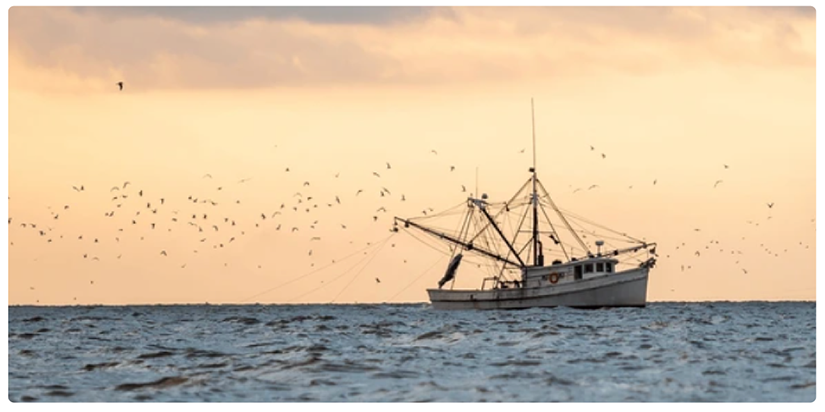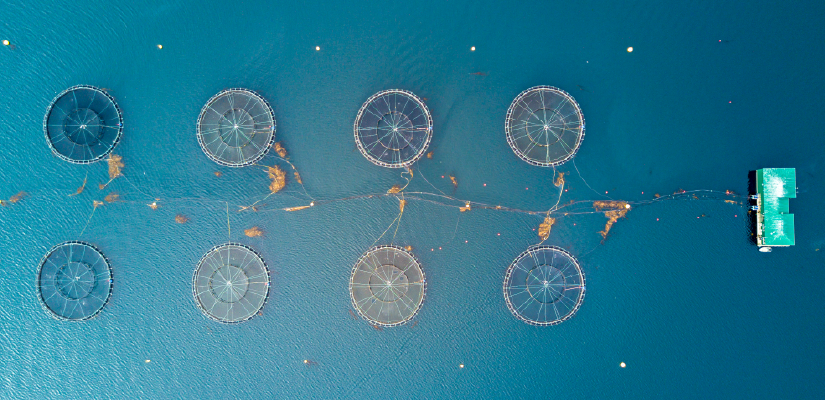
EU Aquaculture
The European Union (EU) Common Fisheries Policy (CFP) defines aquaculture as “the rearing or cultivation of aquatic organisms using techniques designed to increase the production of the organisms in question beyond the natural capacity of the environment, where the organisms remain the property of a natural or legal person throughout the rearing and culture stage, up to and including harvesting”.
Aquaculture is one of the fastest-growing food production sectors in the world and is an increasingly important contributor to global food supply and economic growth.
In Europe, aquaculture plays a vital role in the socio-economic development of coastal and river areas and in preserving the maritime river and fishing culture. In 2020, the EU aquaculture sector reached 1.2 million tons in sales volume and EUR 3.9 billion in turnover value and directly employed around 57 thousand people working for approximately 14 thousand enterprises. These are primarily micro and small enterprises and tend to be family-owned (STECF 24-14).
The legal basis of the EU aquaculture policy lies in the 2013 CFP, which aims to support the growth of the EU aquaculture sector while ensuring its economic, environmental, and social sustainability to provide a source of healthy food for EU citizens and contribute to food security. Specifically, Article 34, “Promoting sustainable aquaculture”, establishes an open coordination method between Member States based on the Commission’s Strategic Guidelines for a more sustainable and competitive EU aquaculture (first adopted in 2013 and revised in 2021).
These guidelines constitute the central pillar of the strategic coordination of aquaculture policy in the Union and seek to build an EU aquaculture sector that is competitive and resilient; participates in the green transition; ensures social acceptance and consumer information; increases knowledge and innovation. Based on these, Member States have been asked to review their Multiannual National Strategic Plans (MNSPs) for aquaculture, where they must lay out their plans, objectives and appropriate measures for the promotion and development of sustainable aquaculture in their territory. Published MNSPs, including a summary in English, can be found under the section Country Information in the AAM website.
The implementation of the Strategic Guidelines and the MNSPs is being supported by funding made available in the European Maritime and Fisheries Fund (EMFAF), which runs from 2021 to 2027. Other EU funding programmes, such as Horizon Europe or BlueInvest II, also finance aquaculture-related research and projects.
Learn more about the EU aquaculture sector at the following links:
- Commission’s Directorate-General for Maritime Affairs and Fisheries (DG MARE)
- Scientific, Technical and Economic Committee for Fisheries (STECF) – The EU Aquaculture Sector – Economic Report 2024 (STECF 24-14)

EU Aquaculture Assistance Mechanism
The EU Aquaculture Assistance Mechanism (AAM) aims to support the Member States, the aquaculture industry, and other relevant stakeholders, in the implementation of the 2021-2030 Strategic Guidelines for a more sustainable and competitive EU aquaculture, through the provision of logistic, administrative, and technical assistance, as well as a one-stop-shop for knowledge and practices about sustainable aquaculture in the EU.
The Assistance Mechanism is part of a Service Contract jointly managed by the European Climate, Infrastructure and Environment Executive Agency (CINEA) and DG MARE. The consortium is coordinated by NTT DATA, Poseidon, SCOPE - Netcompany, the European Aquaculture Society (EAS) and the European Aquaculture Technology and Innovation Platform (EATIP). The Service Contract started in July 2024 and will run until June 2026.
Goals
The AAM provides the European Commission and the EU Member States with logistical, technical and administrative support to implement the new strategic guidelines.
Specifically, several objectives are essential for the EU AAM to reach its final goal:
- Collecting and sharing knowledge, good practices, promoting relevant events, disseminating news and other information about sustainable aquaculture in the EU.
- Providing technical expertise on sustainable aquaculture by supporting the EU Commission to develop guidance documents and background papers on different aspects of aquaculture policy
- Developing training and e-learning tools on these guidance documents and background papers
- Replying to questions from Member States and stakeholders on the guidance documents developed
- Organize events, workshops, conferences, training, and technical meetings directed to EU Member States, the aquaculture industry and other stakeholders to support the implementation of the EU strategic guidelines on aquaculture.
Related links
EU Reference Centres for animal welfare (foreseen under the Official Controls Regulation, adopted in March 2017, which harmonises EU rules on official controls along the whole agri-food chain) are established to assist EU Members States (MS) in their official controls on animal welfare rules on farm, during transport and at the time of slaughter or killing.
The European Union Reference Centre for the Welfare of Aquatic Animals (EURCAW-Aqua) launched in January 2024 was created in accordance with Regulation (EU) 2017/625 of the European Parliament and of the Council and will support the activities of the European Commission and Member States by carrying out scientific and technical studies, as well as conducting training courses and disseminating research findings and information on technical innovations, mainly focusing on the welfare of fish, cephalopods and decapods.
Priority will be given to farmed aquatic species of economic significance for European aquaculture. The EURCAW-Aqua is structured to address the main challenges in assessing the welfare of aquatic organisms, namely the large number of farmed species, the diversity of farming systems and different aquatic environments.
The EURCAW-Aqua will conduct and facilitate the research in the underdeveloped area of aquatic animals’ welfare and will engage in public outreach and awareness.
The work of the EURCAW-Aqua will support aquatic animal welfare objectives contained within the Strategic Guidelines for a Sustainable European Aquaculture.
The European Partnership on Animal Health and Welfare (EUP AHW) is a co-funded European partnership for research and innovation created at the instigation of the EC to address infectious diseases of animals, including aquatic animals, and to promote animal welfare.
Launched in 2024 the Partnership is anticipated to invest €360 million over seven years to boost research and facilitate cooperation between all actors.
The Partnership aims to enhance cross sector collaboration and, through a One Health and One Welfare approach, to provide societal impact.
The objectives of the EUP AHW align with the European Green Deal and its associated Farm to Fork strategy for a fair, healthy, and environmentally friendly food system.
The Energy Transition Partnership for EU Fisheries and Aquaculture (ETP) is a collaborative platform designed to accelerate the energy transition in the European fisheries and aquaculture sectors.
Launched by the European Commission in 2023, the ETP tackles technical, financial, and regulatory barriers by bringing together stakeholders to create practical, actionable solutions.
Membership of the partnership is open to stakeholders across the aquaculture and fisheries sector. It is the intention of the Partnership that through thematic dialogues and workshops, participants address key areas such as innovation, technology, skills, and finance.
Outputs from these activities will contribute to the development of a (voluntary) roadmap, featuring measurable short, mid and longer term milestones alongside concrete actions, with the aim of guiding the sector towards climate neutrality by 2050.
The ETP serves as a hub for sharing knowledge, showcasing best practices, and highlighting innovative projects that support the energy transition.
In addition the ETP operates an ETP Support Group, where ETP Stakeholders can collaborate to discuss challenges, explore strategic approaches, and contribute to shaping the sector's future.
